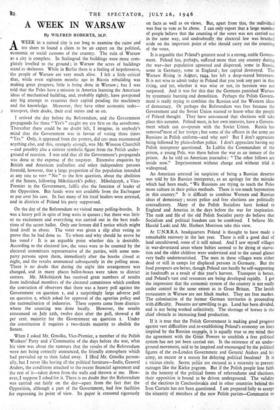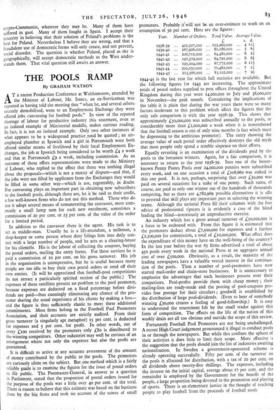A WEEK IN WARSAW
By WILFRED ROBERTS, M.P., A WEEK in a ruined city is too long to examine the ruins' and
A
too short to found a claim to be an expert on the political, economic
or social cuss of the country. The ruin of Warsaw
i as a city is complete. In Stalingrad the buildings were more com- pletely levelled to the ground ; in Warsaw the acres of buildings stand as skeletons. While in Berlin there is a feeling of hopelessness, 'the people of Warsaw are very much alive. I felt a little critical that, while even eighteen months ago in Rinsia rebuilding was making great progress, little is being done in Warsaw ; but I was told that the Poles have a mission in America learning the American ideas of mechanised building, and, probably rightly, have postponed any big attempt to resurrect their capital pending the machinery and the knowledge. Moreover, they have other economic tasks— transport, their docks, their coal mines and so on.
I arrived the day before the Referendum, and the Government propaganda for three " Yes's " caught my eye first on the aerodrome. Thereafter there could be no doubt left, I imagine, in anybody's mind that the Government was in favour of voting three _times "Yes." Only, it appeared from the posters, did one man recommend anything else, and this, strangely enough, was Mr. Winston Churchill —and possibly also a sinister symbolic figure frOm the Polish under- ground of reaction. I was told that all the Government's propaganda was done at the expense of the taxpayer. Extensive enquiries by British and American journalists and other independent persons &retold, however, that a large proportion of the population intended at any rate to vote "No" to the first question, about the abolition of the Senate, following Mikolajczyk's policy. Mikolajczyk, a Vice- Premier in the Government, fulfils also the function of leader of the Opposition. But funds were not available from the Exchequer to put over his case. In fact many of his local leaders were arrested, and in districts of Poland his party suppressed.
On the day of the Referendum we visited many polling-booths. It was a heavy poll in spite of long waits in queues ; but there was little or no excitement and everything was carried out in the best tradi- tions of the secret ballot. Only one feature did I notice which might lend itself to abuse. The voter was given a slip after voting to prove that he had done so. To whom and why should he prove he has voted ? It is an arguable point whether this is desirable. According to the electoral law, the votes were to .be counted by the electoral committees representative of the parties, with some non- party persons upon them, immediately after the booths closed at night, and the results announced subsequently in the polling areas. There is no doubt that during the night this arrangement was changed, and in many places ballot-boxes were taken to district centres. Mr. Mikolajczyk has received great numbers of results from individual members of the electoral committees which confirm the conviction of observers that there was a heavy poll against the Government on question r, and a surprisingly large adverse poll on question 2, which asked for approval of the agrarian policy and the nationalisation of industries. These reports came from districts where the counting was done locally. However, the results announced on July nth, twelve days after the poll, showed a 68 per cent. majority for the Government on question i. Under the constitution if requires a two-thirds majority to abolish the Senate.
When I asked Mr. Gmolka, Vice-Premier, a member of the Polish Workers' Party and a'Communist of the days before the war, What his view was about the rumours that the results of the Referendum were not being correctly announced, the friendly atmosphere which had prevailed up to then faded away. I liked Mr. Gmolka person- ally, but I never like having all the political furniture—India, General Anders, the conditions attached to the recent financial agreement and the rest of it—taken down from the walls and thrown at me. How- ever, I suppose I asked for it. There is no doubt that the Referendum was carried out fairly on the day—apart from the fact that the Opposition, although a part of the Government, had few facilities for expressing its point of view. Its paper is censored rigorously
on facts as well as on views., But, apart from this, the individual was free to vote as he chose. I can only report that a large number of people believe that the counting of the votes was not carried out in the same way, and undoubtedly the electoral law was brushed aside on the important point of who should carry out the counting of the votes.
It is arguable that Poland's greatest need is a strong, stable.Govern- ment. Poland has, perhaps, suffered more than any country during the war—her population uprooted and dispersed, some in .Russia, some in Germany, some in England ; her capital 'destroyed. The Warsaw Rising in Au'ist, 1944, has left a deep-stated bitterness. It is not wise to admit today in Poland that you took, any part in that rising, and yet, whether it was wise or not, its heroism- was not surpassed. And it was for this that the Germans punished Warsaw by systematic burning and demolition. Perhaps the Polish Govern- ment is really trying to combine the Russian and the Western ideas of democracy. Or perhaps the Referendum was free because the Government and the Soviet Union wanted to know what the people of Poland thought. They have announced that elections will take place this autumn. Poland must, in her own interests, have a Govern- ment which can co-operate with the Soviet Union. Russia has removarmost of her tro6ps ; but some of the officers in the army are Russians in Polish uniform—and why not? But I don't appreciate being followed by plain-clothes police. I don't appreciate having my Polish interpreter questioned. In Lublin the Commandant of the prison, a young Pole, was 'there before the war as an inmate of the prison. As he told' an American journalist: " The other fellows are inside now." Imprisonment without charge and without trial is widespread.
An American arrested ''on suspicion of being a Russian deserter was told by his Russian interpreter, as an apology for the mistake which had been made, " We Russians are trying to teach the Poles more culture in their police methods. There is too much bayonetism in this country." It is difficult to combine Western and Russian ideas of democracy ; secret police and free elections are politically contradictory. Many of the Polish Socialists have looked to England and America in the days before the war for inspiration. The rank and file of the old Polish Socialist party do believe that Socialism and political freedom can be combined. I believe Mr. Harold Laski and Mr. Herbert. Morrison take this view.
At U.N.R:R.A. headquarters Poland is thought to have made a remarkable recovery in the last year. There is still a good deal of land uncultivated, some of it still mined. And I saw myself villages in war-devastated areas where babies seemed to be dying of starva- tion and the older children were undersized and to the casual glance very badly undernourished. The men in those villages were either dead or still in camps for displaced persons in Germany. But the food prospects are better, though Poland can hardly be self-supporting in foodstuffs as a result of this year's harvest. Transport is better, and Poland's vast coal resources are being developed rapidly. I got the impression that the economic system of the country is not really under control to the same extent as in Great Britain. The lavish restaurants in Warsaw are not black market. They are free market. The colonisation of the former German territories is proceeding with difficulty. Peasants areunvvilling to go. Land has been divided, and is not being worked collectively. The shortage of horses is the chief obstacle to increasing food production.
If it is true that the Polish Government is making good progress against vast difficulties and re-establishing Poland's economy on lines inspired by the Russian exafflple, it is equally true to my mind that the agreement with the Great Powers to establish a free political system has not yet been carried out. - Is the existence of an under- ground movement, said to be inspired and encouraged by the political figures of the ex-London Government and General Anders and his army, an excuse or a reason for delaying political freedom? It is a vicious circle. Secret polite are excused as a necessity to preven: outrages like the Kielce pogrom. But if the Polish people lose faith in the honesty of the political forms of referendums and 'elections, their opposition is bound to be driven underground. The validity of the elections in Czechoslovakia and in other countries behind the Iron Curtain has not been questioned. I am prepared fully to accept ' the sincerity Of members of the new Polish parties—Communist or
crypto-Communist, whatever they may be. Many of them have suffered in gaol. Many of them fought in Spain. I accept their sincerity in believing that their solution of Poland's problems is the best for Poland. Nevertheless I believe they are wrong, and that a fraudulent use of democratic forms will only create, and not prevent, social disorder. The question is whether Poland, placed as she is geographically, will accept democratic methods as the West under- stands them. That vital question still awaits an answer.































 Previous page
Previous page